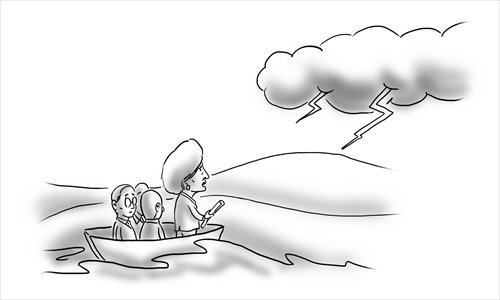After ‘political punishment,’ South Korea ruling party must fulfill promises

Illustration: Liu Rui/GT
The result of South Korea's general election last week has become a heated international discussion. The ruling Saenuri Party won 122 seats, less than half of the 300 seats in the National Assembly. Losing the assembly was without doubt a disastrous defeat for the party. It was the first time in 16 years that the ruling party failed to hang on to parliamentary majority.
The Minjoo Party of Korea (MPK), the country's opposition party, secured 123 seats. Public opinion generally believes that this will bring pressure for the rest of President Park Geun-hye's term in the coming one year and eight months.
The newly established People's Party captured 38 seats, with its chairman Ahn Cheol-soo successfully breaking the two-party dynamic, restoring three-party politics in the nation for the first time in 20 years.
It was not the MPK alone that defeated the Saenuri Party. The outcome of the election showed voters' disappointment over the severe antagonism between the two largest parties in the country, as well as their hope to promote dialogue and compromises in the nation's politics through a third party.
This election is also a bellwether of Seoul's presidential election next year. If Park fails to put forward a sound strategy to deal with the current predicament, her odds of winning the upcoming presidential election will not be in the ruling party's favor.
Last week's election was considered an outbreak of dissatisfaction toward the ruling party, and especially the Park government. It was called an "angry vote," "political punishment" and "victory of people's will."
The failures of the Saenuri Party have been harshly criticized. A number of reasons are listed, such as divided opinions in the leadership due to Park's arrangement of personnel, and that the current members of parliament are only interested in parliamentary politics while neglecting the management of electoral district and voters, as well as changes in the presidential race. According to public opinion, Park failed to deliver political products, which resulted in conflicts within the party during the nomination period. Park's administration has been accused of being arrogant toward the opposition.
The fundamental problem is that Park has not yet fulfilled her campaign promises. The sluggish economy is without question a crucial factor. And this election has once again proved that income, employment, tax, social welfare are major concerns.
The North Korean nuclear crisis is closely related to Seoul's concerns, yet Park's government cannot stop it from deteriorating. Such a phenomenon has made its citizens more discontented. People hope that Park can adjust her policy, and shift her focus to domestic affairs, and the goal to reach a per capita GDP of $40,000.
The harsh reality is that Park's administration will have to face direct containment from the MPK.
If it wants to rule in the future, it will have to reach an agreement with the MPK in the first place. The national budget also requires the agreement of over half seats of the country's National Assembly.
The Park administration's feeble achievements in foreign affairs are unable to offset the impact of the economic slump. A couple of defections by North Koreans didn't cause a sensation in the South, and had little impact on the election. Apparently, North Korea issues are not a useful bargaining chip in the election.
As for observers, to what extent the center-left MPK and the People's Party can pin down Park's foreign policy deserves more attention.
There is a discrepancy in South Korea's social and political spheres over the deployment of THAAD, the implementation of a reconciliation between Seoul and Tokyo over the comfort women issue, and the joint effort with Japan to counter North Korea's nuclear ambitions. The opposition have raised strong challenges against the administration.
A well-developed political regime will minimize party conflicts at the cost of national interest. It is foreseeable that South Korea will continue its foreign policy and strategy in a sustainable manner after the election.
It is only waves instead of a storm that hit Park's vessel. But how to steer the ship after the election warrants our particular attention.
The author is director of the Department of International Political Science, College of Political Science and Public Management, Yanbian University. opinion@globaltimes.com.cn Follow us on Twitter @GTopinion